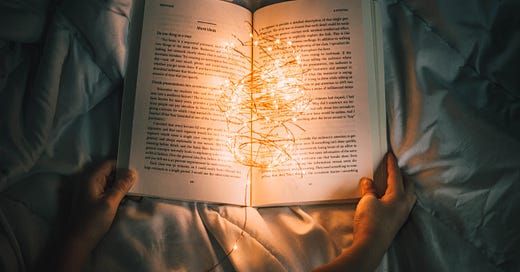For a thousand and one nights, Scheherazade kept telling stories to the sultan. Instead of being executed, like all the other women in the kingdom, the sultan would become so engrossed in Scheherazade’s tales that he’d eventually fall for her charm and intelligence and marry her. Storytelling not only saved Scheherazade, but it has restored peace.
“We tell ourselves stories in order to live.” – Joan Didion
We tell each other stories to share information and connect in a more profound and meaningful way. Stories can bring us closer, heal forgotten wounds, and give us hope. Stories can make us more empathetic and engaged.
After all, we are storytelling beings. We respond better to a narrative sequence, particularly when there is emotional detail, and remember facts easier in a story format as opposed to a list. It is a story that gives human experience meaning.
With the National Storytelling Week coming to an end in the UK, it felt natural to at least mention this in today’s newsletter. I’m a big advocate of stories, and if I were to oversimplify some aspects of my job, I get paid to write stories or help others tell their own.
We can’t deny the power stories have, but shall we take a step back and reconsider whether storytelling is an obvious force for good in human life?
“Some will rob you with a six-gun and some with a fountain pen.” – Woody Guthrie
Jonathan Gottschall, distinguished fellow in the English Department at Washington and Jefferson College and author of “The Story Paradox,” says that we should ditch the “how can we change the world through stories” rhetoric in favour of something less conventional… How can we save the world from stories?
There is a flip side to everything – even stories – and Gottschall goes to some lengths to convince his readers he’s got a point:
“Master storytellers want us drunk on emotion so we will lose track of rational considerations and yield to their agenda.”
Let’s see how Gottschall’s argument can translate in real life:
You tell a story to a group of people and they can relate to it. You make them laugh, you get them excited. You know stories can unite people because we are culturally wired.
The story itself is less relevant than the way you say it. Your story doesn’t need to be factually true. You can choose what to say and what to leave behind information-wise, as long as it sounds emotionally truthful.
Once you’ve got your audience by your side, you are both powerful and dangerous. You can manipulate facts, spread misinformation, and amplify division. You’ve already tapped into your audience’s emotional side with your story. The world is your oyster. What’s next?
“When I say stories are driving the whole species mad, here’s what I mean. It isn’t social media making us crazy and cruel, it’s the stories social media spreads. It isn’t politics severing us from one another, it’s the wedge-shaped stories politicians tell. It isn’t the marketing driving us toward planet-killing overconsumption, it’s the happily-ever-after fantasies that marketers spin.”
Okay. We’ve established that stories can be dangerous and fragment society. But are we relying too heavily on them?
In a TED Talk, economist Tyler Cowen explains how stories work as a filter, choosing which information to take in and which to leave out. The risk is having the narrative simplified to good versus bad. The same story, reiterated in a different way. The real world is often messier than the stories we tell ourselves about it. We can’t have one narrative.
Chimamanda Ngozi Adichie, the Nigerian-American writer, believes that the biggest problem with “the single story” is that it creates stereotypes which not only are untrue, but incomplete:
“The consequence of the single story is this: It robs people of dignity. It makes our recognition of our equal humanity difficult. It emphasises how we are different rather than how we are similar. […] When we realise that there is never a single story about any place, we regain a kind of paradise.”
In a nutshell…
✔️ We learned that our brains love stories because they make our complicated lives more manageable and meaningful.
✔️ In order to be memorable, stories have to be simple, convincing, and easy to understand.
✔️ We, humans, tend to comprise information into simple formulations, so the stories gloss over uncertainties or possible difficulties. This is how the single narrative is born.
Can we live in a world without stories?
No, nor should we. A world without stories would be much emptier and sadder than the world in which we currently live. Some stories are told to manipulate, silence or censor others. If that’s the case, we need more storytellers. More voices. Braver, louder, flying higher to strengthen communities and remind us that, at the end of the day, it is stories that make us belong.
Before we say goodbye… 🥺
If you liked this issue of the newsletter, please click on the 💜 button, so I know I’m doing a good job. There’s always the option to leave a comment with your feedback. I promise I’ll always reply!
💡 Knowledge is no power. Sharing it, that’s power. Why not post about this on social media or forward this email to a pal?





Wow you know this is really interesting take on stories. Of course stories can be used for Manipulation even if it was not the aim of a story as well and some people can even change story meaning to fit their own narrative. But I think I would hate a world without stories it would be awful. So I am very glad for stories in all froms of media. Long live the storytellers that we are. Great read Teodora :D